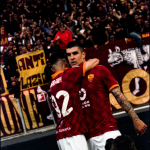
The importance of season tickets in bringing fans back to the stadium
The sold-out Olimpico is the best possible response to the end of the pandemic and a virtuous model to follow for the future
May 6th, 2022
As we approach the end of this season and perhaps finally the limitations due to the Covid-19 pandemic, stadiums are returning to being those magical places of sharing and community. A slow but inexorable return, that in these spring days is giving us extraordinary choreographies in the most important moments of the season also thanks to the impact that the season tickets holders are having in the curves. They have been, in these very complicated months for live football, one of the major resources for sustenance, a sure income even when the stadiums were off-limits due to the well-known limitations. Clubs have tried to keep fans close to their team even when it was physically impossible, involving them in virtual activities and internal decisions, and now they have decided to repay them with various concessions and preemptions. Priority lanes, discounted prices and exceptional treatment for those who have never left their seats empty.
A very successful example was that is AS Roma, which in this last part of the season filled the Olimpico to capacity, both in the Conference League matches against Bodo and Leicester and in those of lesser appeal such as those against Salernitana in Serie A. 64,266 in the stands to support the home team against the then last in the campionato. The hunt for a ticket was repeated for the return semi-final against Leicester City, with queues at online stores exceeding 130,000 requests. A hunger fed by the prices designed to favor season ticket holders, who had a preferential line to secure their tickets. A dedicated price of €10 for Curve and Distinti while €14 was enough to sit in the Tribuna Tevere or Monte Mario, which inevitably caused a frenzy that burned up any availability in a few minutes.
Even an old fox like José Mourinho said he was won over by the affection of the Giallorossi fans, even though he explained that "if we have 70,000 spectators it means nothing. If we have 70,000 who want to play, it's a different story." An impact that pushed the Giallorossi team to the final in Tirana thanks to the goal of Tammy Abraham, who went to exult among his people. Now the fans are already organizing the trip to Albania for Roma's first European final in over thirty years and the club has already made it known that the precious seats will go exclusively to season ticket holders. Of the 6,000 seats reserved for the Giallorossi in the Kombëtare Arena, 166 have already been allocated to the intrepid fans who followed the team to the guest sector of the Aspmyra Stadion in Bodo on 21 October, while the remaining seats will be distributed through a draw today among all tickets holders who sign up. All tickets for Giallorossi fans will be free, a tribute to those who have followed the team through thick and thin.
It was a different story for Barcelona, who during their home Europa League match saw the Camp Nou turn white thanks to the unforeseen arrival of over 30,000 Eintracht Frankfurt fans, pushing the German team to an unhoped-for away victory. An affront that did not please the Blaugrana President Joan Laporta at all, who accused the club's socios of having sold their tickets to German fans with the result of having Xavi's team play in a hostile environment. Defined by Laporta as "the greatest infamy in the club's history,"the photos of the Camp Nou curve colonized by Eintracht fans went around the world and showed how the stadium can still be a magical place, where the impossible can happen.
The sale of tickets by season ticket holders is a common practice in American sports, where a very high number of games are played in each season, while in European soccer it is still viewed with great disdain. A different way of experiencing the stadium atmosphere, but the same need to have a hard core of fans who are not only present but also paying. A priority, obviously accentuated by the pandemic, but one that could become an increasingly fixed habit, following the trend of creating an ever closer relationship between the team and the stands. If also in the next season, finally without restrictions on numbers, we will continue on this path of strong fan loyalty, creating a real club within the club, with pre-emption lists and prices tailored to those who can access or those who have already been subscribers for years.
Having a consistent number of regular season tickets holders means being able to plan with more certainty for the future and create additional levels of interaction between the public and the club, such as contests for jersey design and activities linked to fan tokens. Without bothering some of the big Premier League teams, which have waiting lists that go back decades, season tickets, which have always been a certainty among organized supporters in Italy, can become even more crucial to the economy of a club in a soccer that, hopefully, can be defined as post-pandemic.


















